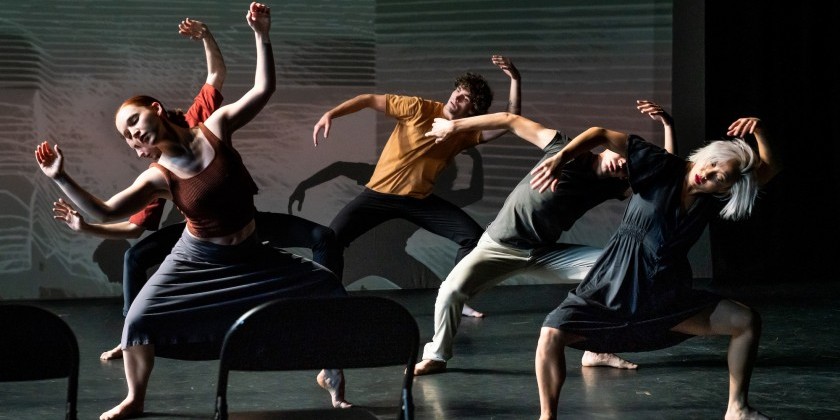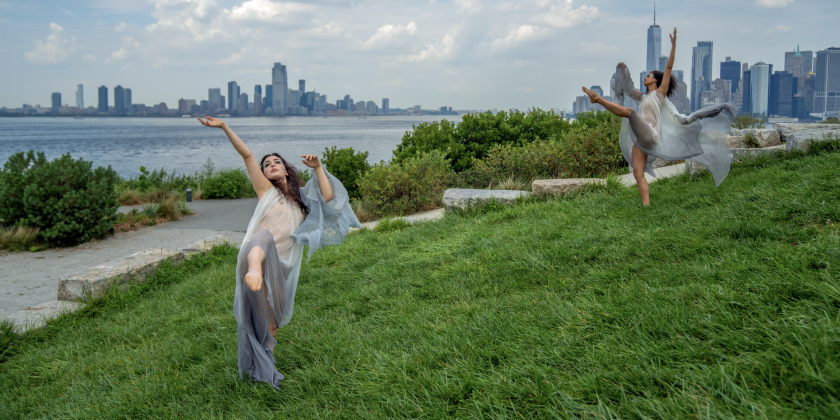DAY IN THE LIFE OF DANCE: Blakeley White-McGuire and Daniel Fetecua Discuss "The Tongue of the Flame," Their Modern Dance Lineages, and the Role of Caretaking

BronxArtSpace
305 East 140th Street
Produced by Daniel Fetecua Productions
March 25 and 26 at 7:30 p.m.: The Tongue of The Flame and Bella Vista Project
March 27 at 7:30 p.m.: Holding for Embrace and Bella Vista Project
Visit HERE for more information and to purchase tickets
America has never been a touchy-feely country. We like to keep our distance, both physically and emotionally. This can be witnessed in how close we'll stand next to someone at a party, which is usually a foot or so away, to how we respond to the standard how-are-you greeting. The answer is fine, even when it's not.
COVID-19 has deprived us of our smallest moments of pedestrian intimacy — handshakes, pats on the back, sharing a bus seat — and we're poorer for it. As restrictions loosen, perhaps we can use our reentrance into communal situations to probe the role of touch and caretaking to end in a place that is less robotic and more humanistic.

One place to start that investigation lies in The Tongue of the Flame, a dance-theater work-in-progress co-choreographed and co-produced by Blakeley White-McGuire and Daniel Fetecua, which will be presented as part of the three-night Dance to Embrace at BronxArtSpace, produced by Daniel Fetecua Productions. White-McGuire says their goal is to interrogate "the human potential for transformation inside the labyrinth of individual choice, by experimenting with liminality, in the realms of love, sexuality, and compassion."
To share weight, to hold a hand, to caress another — these actions involve one body trusting another, one human ministering to the other. This type of trust is essential to The Tongue of the Flame. White-McGuire explains, "We're looking to annihilate social structures, and we're asking ourselves, why would we accept certain boundaries? Why would we accept certain rules and reject others? We're crossing a lot of boundaries. The first section is nude, which is not so revolutionary. However, we're nude and very intimate, not in an erotic way, but in a pure, open-hearted, open-bodied manner. Nothing is off-limits. When you start with nothing is off-limits, you better trust the person you're working with."

White-McGuire and Fetecua have a deep well of dance experience from which to draw. She is a former principal with the Martha Graham Dance Company, and he was a member of the Limón Dance Company. They met over a decade ago when both troupes were presented on the same stage in Italy and then reconnected while dancing with Movement Migration under the artistic direction of Kim Jones. White-McGuire describes their connection as "something beautiful about the organic nature of our work. We have a willingness to take control, a willingness to submit control, a willingness to listen and experiment, and to say yes in the space of care together."
When they get together in the studio, the ghosts of Graham and Limón accompany them. They acknowledge these legends' shared interest in probing the human experience, but their curiosity pushes them forward. Fetecua says, "I cannot deny I have that influence of Limón, but I mix things in from my own background, like Colombian traditional dance and my experience with tanztheater in Germany. I feel like the legacies have been passed on, and each of us has our own path in our family history, but the roots are interconnected."

In addition to Tongue of the Flame, Fetecua, with support from iD Studio Theater, will present two other works as part of Dance to Embrace. Premiering in 2012, Bella Vista Project was created to commemorate the bloody La Masacre de Bojayá in Colombia's Pacific Coast. Employing disparate dance forms such as tanztheater, American modern dance, and Colombian folk dances, Fetecua depicts the arc of the massacre, from normality to devastation.
He performed extensive research to manifest the shock and horror by scrutinizing personal testimonies and exploring the town itself. "This is the right time to bring the piece back, especially because it's related to the exhibit [at BronxArtSpace curated by Beverly Emers] called Giving Light: An Art Antidote to Gun Violence. Next year is going to be the 20th commemoration of the massacre, so my aim is to bring the piece back to Colombia," Fetecua says.

The third work, Holding for Embrace, was born out of the pandemic. It explores hugs, and how they’ve changed over the year of COVID-19. "I worked with two beautiful dancers from Argentina, who were able to dance together because they were living together and were able to embrace," Fetecua explains.
As for the fate of Tongue of the Flame, Fetecua and White-MacGuire hope to expand it into a full-length work, adding in a dramaturg and composer. Both, though, have maintained busy schedules of teaching and creating. White-McGuire has a book coming out about the Martha Graham Dance Company that will be released by Bloomsbury Publishing UK. Fetecua will debut The Unspoken Tales of the Tarrytowns, a piece exploring the immigration experience, in the fall of 2021 in conjunction with the Legend Bicentennial Festival celebrating Washington Irving's Legend of Sleepy Hollow. In the meantime, they hope you'll think about the role of touch and caretaking in your everyday life.














